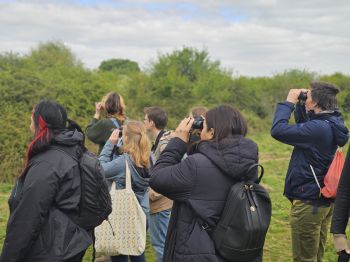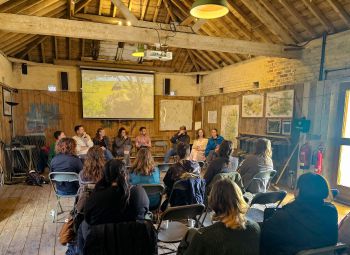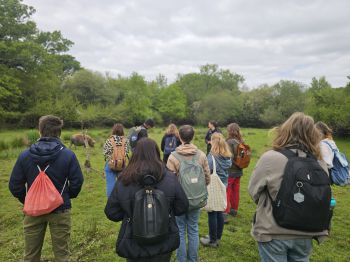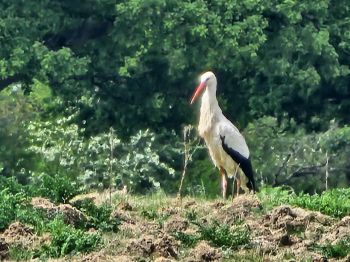Students explore green careers and rewilding in action with visit to pioneering Knepp Estate
By: Joseph Mcloughlin
Last updated: Wednesday, 28 May 2025

The day began with a guided tour of the estate where students spotted a variety of threatened birds and animals.

Following the tour, students had a chance to hear career insights from several Knepp staff members during a Q&A panel event.

Three Tamworth Pigs, a threatened species, are seen here happily grazing nearby as the students watch.

A highlight of the visit was spotting wild White Storks, reintroduced to Knepp after 600 years.
On Tuesday 6 May, as part of our Career Lab programme, a group of 10 students participated in an Insight Visit to the Knepp Estate in the West Sussex Downs.
The students learnt about the Knepp Estate’s pioneering rewilding project that restores natural ecosystems to former farmland by allowing nature to take its course, using free-roaming grazing animals and minimal human intervention to promote biodiversity.
Among many successes of the Knepp Estate, one of most notable occurred in 2020 when it became the site of the first successful wild breeding of white storks in the UK for over 600 years.The students were lucky enough to see not only a few different pairs, but also their young chicks, sat comfortably within their giant nests. They also managed to spot other rare and threatened species reintroduced to Knepp, including Tamworth pigs and Longhorn cows, as well as birds such as Cuckoos and Nightingales, both of which were heard singing away nearby as the students were guided through a section of the 3500-acre estate by their knowledgeable and engaging guides, Ryan Greaves, Izzy Bridges and Ned New.
Industry Insights
After an insightful two-hour tour of the Knepp Estate followed by lunch in the sun, a panel of staff, including their Ranger, Director, Wild Futures Manager and Communications Assistant, hosted a Q&A on career opportunities in conservation and sustainability. They offered a wealth of guidance on breaking into the sector, emphasising that there’s no single path to success. The panel highlighted the variety of their own backgrounds, showing that passion for nature, adaptability, and enthusiasm often matter more than a traditional conservation degree.
A key message was the value of soft skills, especially communication and authenticity. Employers are drawn to candidates who bring originality, energy, and personality to their work and they may not know exactly what they want in a candidate until they meet someone who simply feels like the right fit, so students were encouraged to show their passion confidently and creatively. Rather than fitting a set mould, being genuinely yourself, whether through interests in writing, music, or reading, can help you stand out.
Practical advice focused on being proactive. Instead of waiting for roles to appear, students were urged to take initiative: reach out to organisations, offer to volunteer, or express how they could contribute to an organisation, even if a formal role doesn’t currently exist. The panel suggested finding aspects of a project or organisation that resonate with you and show how your strengths align. Perseverance can be the deciding factor, and showing commitment often opens doors. Libby Drew, Director of the Knepp Estate, said that reaching out to organisations and chasing up if you don’t hear back is not only acceptable, but often welcomed. The panel also emphasised learning from failure, stressing that mistakes are a key part of growth and that a big-picture mindset is vital in impactful conservation work.
For those hoping to work at Knepp, opportunities include internships, assistant roles, and the Young Guides program. The stories of Sussex graduates Tanya Forbes and Izzy Bridges, the latter of whom founded a campus rewilding society, showed how extracurricular efforts can provide a major edge to applicants. The session closed with reflections on the rewards of conservation work: witnessing public excitement about nature, working creatively in a dynamic and varied sector, feeling lucky to be paid for something they truly care about and seeing the data-backed impact of the work they do. They encouraged students to be curious, brave, and open-minded and their final advice was to say yes to opportunities, to believe in yourself, and to remember that if you’re in the room or applying for a role, it’s because you deserve to be there.
Conclusion
The Knepp Estate panel provided a compelling reminder that conservation is for anyone with passion, curiosity, and the courage to take initiative. They encouraged students to embrace who they are, take risks, and remain open to learning from both success and failure. Whether through volunteering, personal projects or simply reaching out with enthusiasm, there are many ways to begin a journey into conservation. The panellists’ experiences showed that meaningful careers are often built not from perfect plans, but from persistence, adaptability, and a genuine desire to make a difference. For students considering this path, the key is to be yourself and follow your passion.
Opportunities with Career Lab
The Insight Visit to the Knepp Estate was part of Career Lab 2024/25. Career Lab is a programme open to all Sussex taught students. It is a series of opportunities designed to develop students’ skills, experience, connections and confidence, to help boost career prospects. For more information about the programmes open to you, visit the Career Lab website.
Further support
Your Careers and Entrepreneurship team are here to support you and have a variety of resources to help those interested in careers in sustainability and conservation.
Green Futures, an annual panel event that included a mini sustainability challenge, took place recently on 3 April and offered students a greater understanding of ‘green’ graduate roles and where to find one as well as help and advice on breaking into the sector.
You can access the event recap, which offered students further industry insights and advice on the breaking into the sector.
Sustainability and conservation roles are advertised year-round on CareerHub.
Those who would like to work for Knepp can also keep an eye on their CareerHub vacancies page.
All students can also access Sussex Connect, a platform to connect with Sussex alumni where you can research and reach out to people working at organisations of interest to you; and LinkedIn Learning, where you can make the most of free online courses in green and transferable skills.
For further support, visit the Careers and Entrepreneurship website at https://student.sussex.ac.uk/careers/
